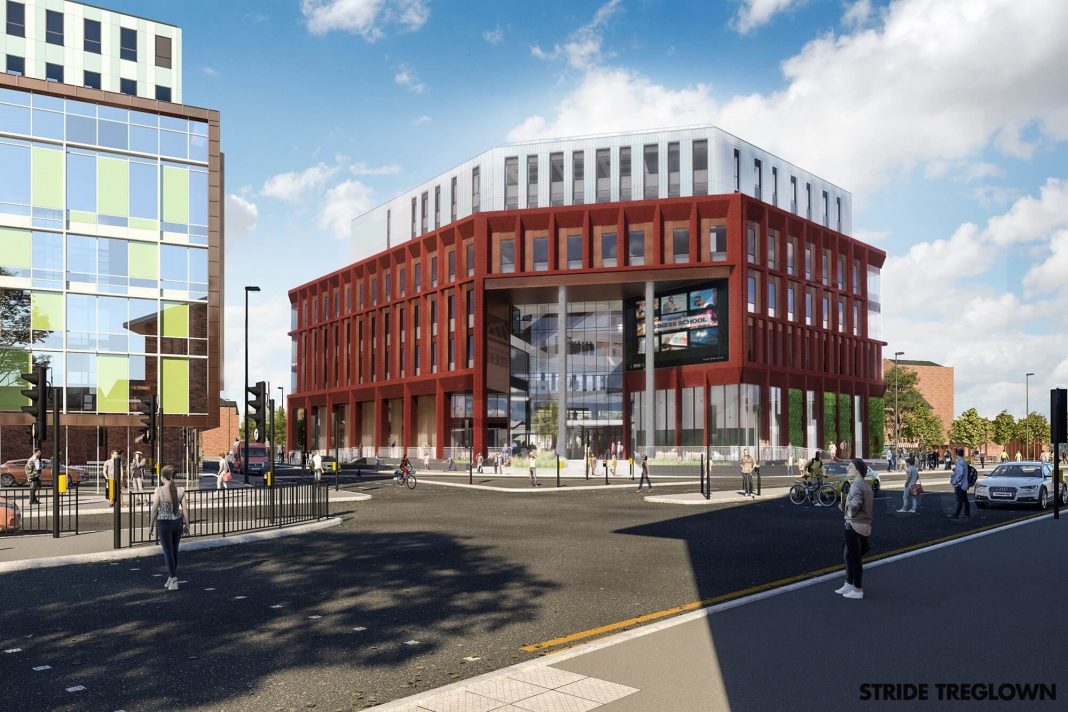A planning application for a new Derby Business School has been submitted by the University of Derby, bringing its plans to grow its presence within the city centre a step closer.
The proposed development is set to be built on land adjacent to the University’s One Friar Gate Square building in the city centre.
Projected to be the study base for more than 6,000 students by 2030, the plan is to create a central hub providing students, researchers, academics and the wider business community with access to research and development, expertise, key facilities, and learning and networking opportunities.
The Business School will kick start the University’s recently-announced City Masterplan – the vision for how it intends to develop its city centre footprint and improve connectivity between its sites.
If approved, construction is due to commence in November 2022, with the building set to open in September 2024.
“Through the launch of our City Masterplan we have clearly set out our long-term commitment to supporting the city’s ongoing regeneration and growth, as well as enhancing its overall vibrancy and appeal as a place where people want to study, live and work. The Business School has a key part to play in this and we are excited to see our plans come to fruition.”
The new building is proposed to be net zero carbon in construction and operation, in line with the University’s sustainability strategies and its low carbon expertise and research agenda. It will feature innovative teaching and learning spaces including a virtual reality suite, stock market trading room, creative labs and makerspaces. Alongside this, the building will be a technology-enabled smart campus and be used as a living lab for research projects from across the University and industry.
Professor Kamil Omoteso, Pro Vice-Chancellor Dean for the College of Business, Law and Social Sciences, said: “We recognise the importance of having a central location for our Derby Business School and understand this is crucial to help further develop collaboration between our students, business community and academics.
“Not only will the Business School provide our students with an outstanding learning environment, it will put a wealth of knowledge, research and innovation within easier reach of those who could really benefit from that expertise.”
Working with architects Stride Treglown, the University announced its vision for the new Derby Business School in May 2021 and held a public consultation on the plans in December 2021.
Cora Kwiatkowski, head of universities at Stride Treglown, said: “We are delighted to be involved in the design of the state-of-the-art, future-focused Derby Business School. This will be the first building of the University’s ambitious City Masterplan and will provide a focal point for Derby’s business community.
“The net zero carbon building is designed with a strong focus on wellbeing and biodiversity, and we’re proud to say that it’s set to become the most sustainable building on campus, supporting the University’s vision to become carbon neutral.
“We’d like to thank the client team and stakeholders who worked closely with us to create innovative, real-world learning facilities and a variety of collaborative spaces, which will bring students, staff and businesses together to make valuable connections.”
In addition to the Derby Business School and City Masterplan, the University has also recently launched the University of Derby Regional Economic Observatory, an independent initiative designed to work with local businesses and engage with people and communities to build a robust evidence base and produce analysis to inform economic and social policy.



